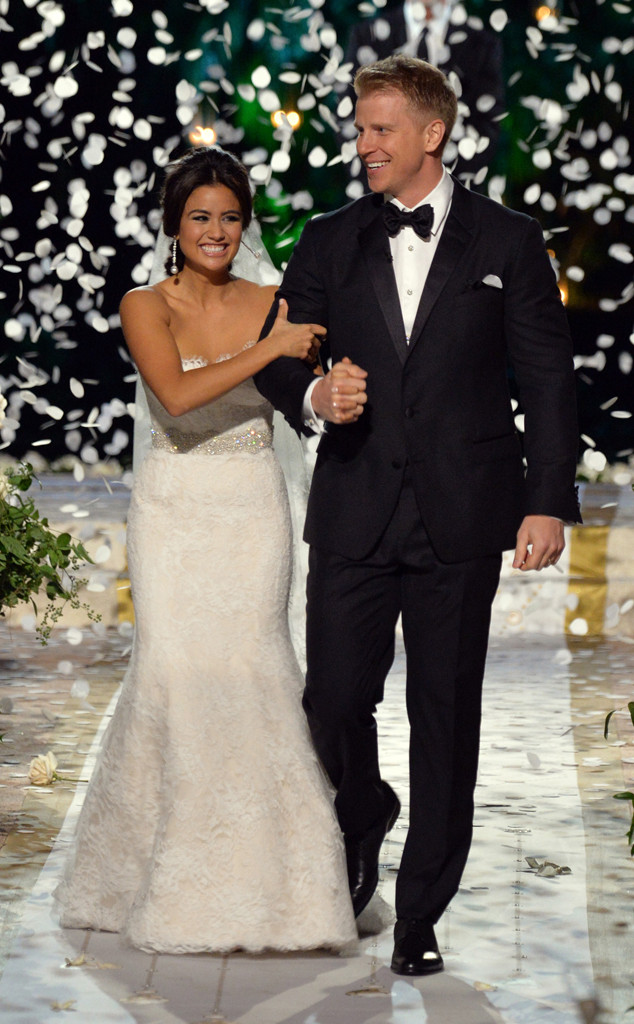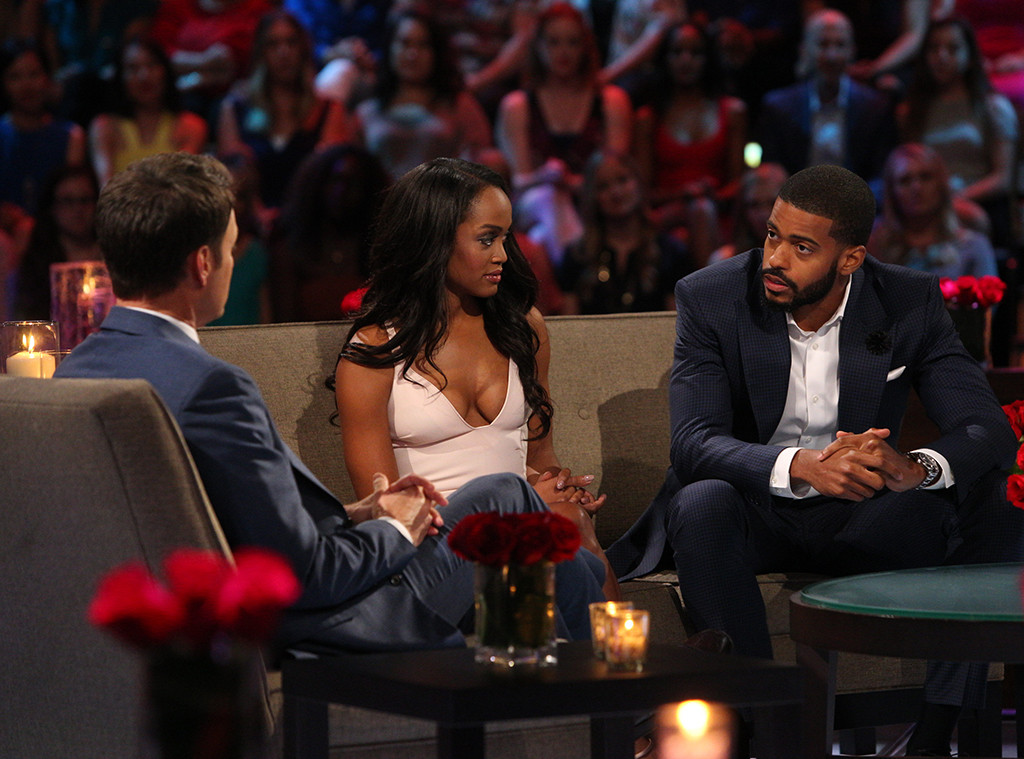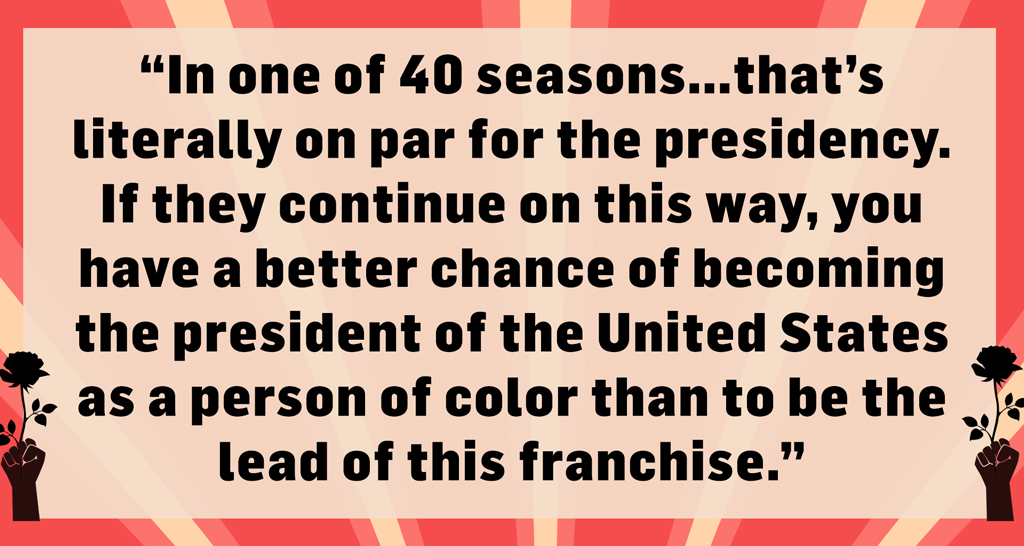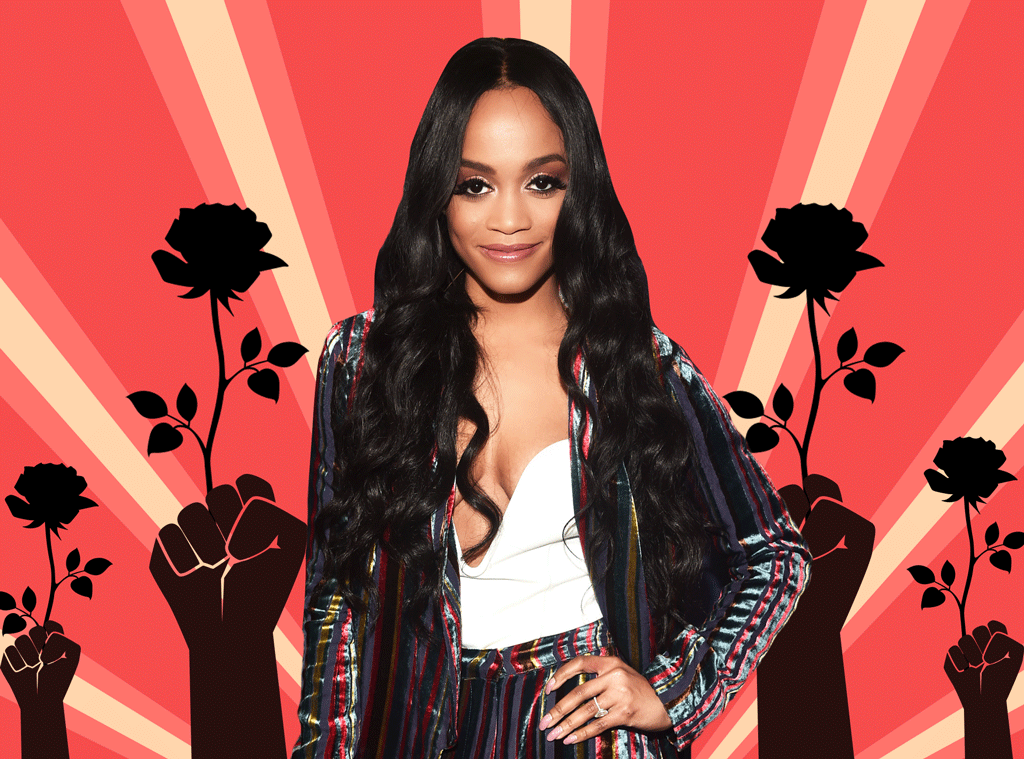Bachelor Nation is ready for a revolution and they want it televised.
As the Black Lives Matter movement continues with nationwide protests and calls for action following the death of George Floyd, a group of fans of The Bachelor franchise have come to together to form the Bachelor Diversity Campaign, calling for the ABC reality series to commit to featuring Black, Indigenous, People of Color (“BIPOC”) cast members, storylines and relationships moving forward.
While a reality dating competition may at first seem insignificant or inconsequential when it comes to the Black Lives Matter movement at large, The Bachelor franchise isn’t just another reality show. For almost 20 years, it has been a driving force of cultural conversations, a launch pad for aspiring (and successful) social media influencers and has remained one of this generation’s most successful and influential TV shows.
But as its continued to evolve when it comes to sexuality, religion, social media and its own outdated views on proposals and marriage, the franchise has been accused by fans and former cast members of having a major and glaring blind spot when it comes to race: In its 40 seasons of The Bachelor and The Bachelorette, there has only been one black lead. And in those 40 seasons, not one black person has made it to the final two.
And that is why one of the most popular TV show’s lack of diversity is more important; how can a reality TV show be real when it is continuously not reflecting the reality of the world we live in?
As the sole Black lead, Rachel Lindsay has continuously expressed her desire to see the franchise evolve since she joined the fold as a contestant on Nick Viall‘s season of The Bachelor in 2017, despite never having watched the show prior to her co-workers nominating her.
Getty Images; Melissa Herwitt/E! Illustration
“You often hear me say I never watched the show before…what I think what’s different for me or people of color who say they’ve never watched the show versus white people who say they’ve never watched the show is that there’s a reason I’ve never watched the show. It’s not because I’m not a fan of reality TV, God knows I love my share of good reality TV,” Rachel said on her podcast, Bachelor Happy Hour. “The reason I didn’t watch…is because The Bachelor did not appeal to me in any kind of way because it was notoriously known in the Black community that The Bachelor was not for us. It was a running joke; if you’re Black, you only make it past week three, there’s never a lead.”
Rachel became the first Black contestant to make it to the final three. It took 21 seasons and 15 years for that milestone to happen.
So when Rachel was officially named the Bachelorette for season 13, it was a historic moment…and also a long over-due one that many hoped signaled a necessary shift moving forward.
But as viewers know, it didn’t.
While Rachel ended the season happily engaged to Bryan Abasolo, whom she would go on to marry in August 2019, every season that’s followed has had a white lead (though 2020’s Peter Weber was the second-ever Hispanic Bachelor after Juan Pablo Galavis).
In a 2017 interview with The New York Times, franchise creator Mike Fleiss expressed his dismay in the ratings decline during Rachel’s season, with her finale garnering 7.57 million viewers and a 2.1 rating in the adults 18-49 demo. For context, JoJo Fletcher‘s preceding season attracted 8.5 million viewers and a 2.5 rating.
“I found it incredibly disturbing in a Trumpish kind of way,” Fleiss said. “How else are you going to explain the fact that she’s down in the ratings, when—black or white—she was an unbelievable Bachelorette? It revealed something about our fans.”
Fleiss wasn’t wrong when he said the ratings said something about the show’s fans, but he wasn’t right either.
As the show had been cultivating that fanbase for over 15 years by that time, finally casting the first person of color as a lead was, to fans, the proverbial band-aid over a bullet wound.
Per Buzzfeed in 2018, The Bachelorette‘s audience that season was more than 80 percent white and 12 percent black according to Nielsen’s live-plus-seven-day statistics, while JoJo’s season was 86 percent white and 7 percent black. The Bachelor season starring Nick Viall had the same numbers as JoJo, placing in the bottom 20 across all of primetime network programming for its Black viewership.
After having their first Black Bachelorette, the show picked Becca Kufrin, a white publicist who earned the sympathy of Bachelor Nation when she was broken up with by Bachelor Arie Luyendyk Jr. in front of cameras.
Becca’s finale? Down almost a million viewers from Rachel’s and dropping to a 1.8 rating. As for the finale of former beauty pageant queen and future Dancing With the Stars winner Hannah Brown‘s beloved season, her not-so-fairy-tale ending attracted 7.2 million viewers and a 1.9 demo rating, down in both measurements from Rachel’s season, according to Nielsen.
No comments were made about the reasoning for the decline in ratings were available.
Even before Rachel’s casting, discussion of the franchise’s lack of diversity had been going on for years.
In 2011, Fleiss said casting for people of color felt like “tokenism,” going on to explain to Entertainment Weekly, “Oh, we have to wedge African-American chicks in there! We always want to cast for ethnic diversity, it’s just that for whatever reason, they don’t come forward. I wish they would.”
One year later, two Black men came forward filing a racial-discrimination suit against the network and producers. Football players Nathaniel Claybrooks and Christopher Johnson both alleged that they threw their hats into the suitor ring and never made it to the second round of interviews.
The show denied the allegations, issuing a statement that read, “This complaint is baseless and without merit. In fact, we have had various participants of color throughout the series’ history, and the producers have been consistently—and publicly—vocal about seeking diverse candidates for both programs. As always, we continue to seek out participants of color for both The Bachelor and The Bachelorette.”

Todd Wawrychuk/ABC
Prior to the suit, which was filed ahead of season 17, seasons 13-16 featured no black contestants (seasons 1-12 featured a total of 16).
Season 17, which starred Sean Lowe and was the first to air after the lawsuit, featured four black women and six contestants of color overall, with Catherine Giudici, who is half-Filipino, ending the season engaged to Sean.
Catherine, who has since married Sean and the couple has gone on to have three children, recently reflected on representing people of color on the show.
“When I was originally cast, I was very flattered but somewhat grounded by the fact that I would be one of the faces that represented people of color. I knew that one of the reasons I was probably chosen was because I was Filipino,” she wrote on Instagram, adding that she “counted myself out to be [Lowe’s] fiancée because of what I assumed Sean liked…I thought I was there just to check a box. But I ended up with so much more.”
But before Nick’s season in 2017, which featured eight non-white contestants (the most for any season to-date), no Black contestant had ever made it to the final four on The Bachelor or The Bachelorette—another shocking first to add to Rachel’s Bachelor resume.
While Nathaniel and Christopher’s suit was ultimately dismissed, with the judge ruling that casting was protected by the First Amendment, it made the conversation about the show’s lack of diversity impossible to quiet down.
Twice a year, TV journalists from around the world gather together for the Television Critics Association press tour, with networks presenting their new shows and offering updates on their current programming.
Year in and year out, the ABC president—whether it was Paul Lee or Channing Dungey or Karey Burke—are asked about when, if ever, the franchise would pick a Black lead.

Paul Hebert via Getty Images
“You are going to see diversity as we go through that,” Lee said in 2015. ”[Current bachelor] Chris [Soules] the Farmer is not but I’m sure many of the future guys are going to be.”
In January 2016, his last press tour as the head of the network, he updated, “We’re doing a whole lot of tweaks. We have the farm team, right, which allows us to then pick the next one. But I’d be very surprised if The Bachelorette in the summer isn’t diverse. I think that’s likely.”
By August of that year, his successor Dungey said there was a ”need to increase the pool of diverse candidates in the beginning…what we’d like to do is widen the pool.”
The lack of diversity in the casting process stage is something Fleiss also addressed in a January 2016 interview with Reality Burred.
“The vast majority of our applicants are less than diverse…it’s a hard thing to do because we can only cast the people—we can only put people on the show who want to be on the show,” he said “So if 90 percent of the people who want to be on the show are white, well, that makes it challenging for us.”
Basically: Rachel seemed to be that golden needle in the haystack.
After earning the first impression rose in Nick’s premiere and going on to become a fan-favorite, the “historic” announcement was made in February 2017 that the Dallas lawyer was going to be the franchise’s first Black lead.
But it was a role she nearly turned down.
“I ultimately decided to be the Bachelorette because I knew this opportunity was bigger than me,” she wrote in a post on her “Candidly Rach” blog this week. “I knew that I wanted to present myself to an audience that had not seen a lead of color in this role.”
Wanting to be “a trailblazer” in the franchise, she expressed her disappointment and frustration in still being the sole black lead almost four years later.

Getty Images; Melissa Herwitt/E! Illustration
And it’s not like there haven’t been strong candidates over the years to be the first Black Bachelor: Marquel Martin was a fan-favorite during Andi Dorfman‘s season, viewers gushed over Wills Reid‘s quiet charisma and trendy wardrobe during Becca Kufrin’s season and Eric Bigger, who made it during the final three of Rachel’s season, had a lot of support behind him to be the next Bachelor, thanks to his compelling backstory and endlessly positive outlook. (“It’s miracle season” was his tagline, with the personal trainer basically doing the ABC promotional team’s work for them.)
And then there was Mike Johnson, one of the breakout contestants from Hannah Brown‘s season.
An air force veteran with a million-dollar smile and that face and that body and that sensitivity, Mike was eliminated in week seven, fans quickly began campaigning for him to be the next Bachelor before he was even able to buckle his seat belt in the van ride to the airport.
And Rob Mills, the senior vice president of alternative and reality programming at ABC, confirmed he was in the running for the job.
“He is just somebody that people really love. He’s got a great story. We have somebody who has served our country, has really suffered through heartbreak,” he told Entertainment Tonight at the time. “You’ve got a billion-dollar smile and he looks great. He’s got a following; those are the reasons he’s in contention more than, ‘Oh, this is so great, we can check that off now.'”
Before the announcement was made that Peter Weber would be the next Bachelor, however, a source told E! News that the pilot had been the frontrunner the whole time and producers were waiting to see how Mike’s time on Bachelor in Paradise played out.
“Peter has always been their guy,” an insider told E! at the time. “He’s older, he has a career and he has a great backstory. He can definitely carry a show.”
To dissect that line of reasoning, Peter was 28, Mike was 31; Peter is a pilot, Mike’s a portfolio manager and air force veteran; Peter had his heart broken by Hannah after they had sex four times in a windmill, Mike’s last relationship ended after his ex suffered a devastating miscarriage.
Ahead of the final decision, Burke, the current ABC president, addressed the casting at the network’s summer press tour.
“I can tell you, the conversations are ongoing about who the next Bachelor will be,” Burke told journalists in August 2019. “I do think that the show has worked hard to increase diversity in casting. And, as that evolves, we’ll continue to see more diversity in the franchise.”
One month later, Peter was officially named the next Bachelor.
After learning he would not be the next Bachelor, Mike expressed his desire to see more representation in the franchise moving forward.
“I think of diversity more than just black and white. And yes, Peter has a Cuban mom, but let’s just be honest…he’s white, right? And that’s just being completely transparent,” Mike said to Entertainment Tonight. “I think that there should be an Asian lead, an Indian lead…diversity is not just black and white. It’s not just salt and pepper.”
He went on to say, “a Black Bachelor should have been cast,” adding that the show “knows what they’re doing for their audience.”
And that begins the Bachelor’s version of the chicken or the egg conversation all over again, a frustrating and seemingly endless loop of trying to explain the lack of diversity.
That is, until June 8, when the Bachelor Diversity Campaign officially launched, calling on the franchise to take action. “40 seasons. 18 years. 1 Black lead,” its simple and effective marketing read.
“In one of 40 seasons…that’s literally on par for the presidency,” Rachel recently said on The Ringer’s Bachelor Party podcast. “If they continue on this way, you have a better chance of becoming the president of the United States as a person of color than to be the lead of this franchise.”
To put that in perspective, there’s about a one-in-200 million chance of becoming the president.
“The franchise, and all those who represent it, should reflect and honor the racial diversity of our country—both in front of and behind the camera,” the campaign states.
At press time, the Change.org petition has over 75,000 signatures, with many cast members including Rachel, Nick Viall, Seinne Fleming, Tyler Cameron and Jubilee Sharpe among others expressing their support for the campaign and asking for the franchise to commit to 13 calls to action, including a promise to cast BIPOC for at least 35% of the contestants moving forward, hire a diversity consultant and select a black lead for The Bachelor‘s 25th season, something they have failed to do despite Fleiss expressing a desire to do so back in 2017.
“I’m raring to try it again,” Fleiss told the New York Times about bringing in another person of color as the lead after Rachel’s tenure. “I think it’s important.”
But pointing out that there is a diversity problem isn’t the same as actively addressing and working towards rectifying it. And many viewers and members of Bachelor Nation say they are fed up…especially Rachel, who has vowed to disassociate with the franchise if it does not address its issues with race after years of calling for changes to be made (on their official podcast that she co-hosts, no less).
“Only time will tell how the franchise will respond, but to date they have been silent,” she wrote in a blog post. “Until then, make sure you tune in on Mondays for all the white reasons to watch The Bachelor: Greatest Seasons Ever as it will weekly highlight the very thing that is wrong with this franchise.”
ABC and WBTV have not yet commented on the petition or responded to request for comment, though both have expressed their support of the Black Lives Matter movement.
